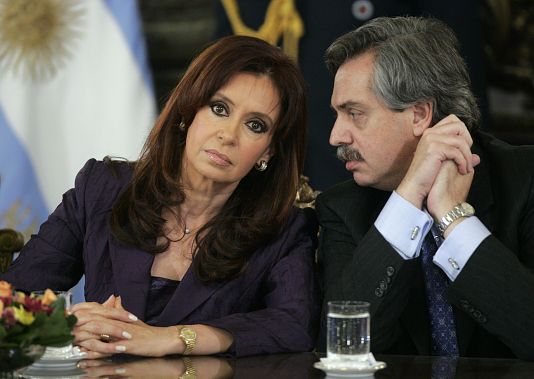Alberto Fernandez received over 47% of the vote in Argentina's primary elections.
Presidential candidate Alberto Fernández pulled off a resounding victory in Argentina’s primary elections last Sunday when he received more than 47% of the vote.
 ADVERTISEMENT
ADVERTISEMENT
 ADVERTISEMENT
ADVERTISEMENT
Argentine President Mauricio Macri, a conservative leader known for tough austerity measures, received just 33% of the vote.
"Today we had a bad election, and that forces us to redouble our efforts in October to continue with the change," Macri said.
The first round of the presidential election is October 27, however, and Fernández showed that he could have enough support to avoid a run-off in November.
Candidates need at least 45% of the vote to win outright in the first round of the presidential elections or 40% with a 10% lead over the nearest opponent.
The primaries are seen as a good indicator of public opinion ahead of the elections as all parties take part in them and voting is compulsory.
"As they are not binding, the elections have served as an excellent opportunity to unload much dissatisfaction that a large part of society had been expressing about the current government," said Adriana Amado, an Argentine expert in political communication.
She added that there is always room for a change in the political situation and that people who have abstained from voting in these elections could change the result come October.
Argentina is deep in recession with high levels of inflation.
Who is Alberto Fernández?
Fernández is no stranger to Argentine politics and has long known Argentina’s former presidents Néstor Kirchner and his successor and wife Cristina Fernández de Kirchner.
Cristina Fernández de Kirchner is on Fernández’s ticket and would serve as his vice-president if he wins the presidency.
The former president is a familiar face whereas Alberto Fernández isn't.
"He wasn't a well-known figure, wasn’t sought after and doesn’t generate much interest," said Adriana Amado.
Born in Buenos Aires in 1959, Alberto Fernández entered politics in the early 1980s towards the end of the last dictatorship.
He finished studying law around the same time at the University of Buenos Aires.
Fernández as president would bring back Peronism, a political ideology and movement dating back to the country's president Juan Domingo Perón. It's sometimes called a populist movement though many experts say it's neither left nor right.
Relationship with the Kirchners?
Alberto Fernández was the head of the former president Néstor Kirchner's electoral campaign in the 2003 and later served as Chief of his Cabinet of Ministers.
He went on to run Cristina Fernández de Kirchner’s presidential campaign during the 2007 elections, but he resigned his post in her administration in 2008.
He later criticised the Argentine president, stating that he was kicked out of the government and that Fernández de Kirchner had mismanaged the economy.
He also said she led a “bad government”.
But in May it was announced that Cristina Fernández de Kirchner would be running mate on a Fernandez ticket.
"All of us who had criticised her at one time or another understood that it was a mistake to continue confronting each other when Argentina's problem was called Macri” Alberto Fernández explained of the seeming reversal.
Fernández de Kirchner faces several corruption charges.
Argentina’s peso, meanwhile, plunged after the election results amid fears of a return to previous interventionist economic policies.











